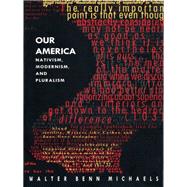Our America
, by Michaels, Walter Benn- ISBN: 9780822317005 | 0822317001
- Cover: Hardcover
- Copyright: 11/1/1995
Arguing that the contemporary commitment to the importance of cultural identity has renovated rather than replaced an earlier commitment to racial identity, Walter Benn Michaels asserts that the idea of culture, far from constituting a challenge to racism, is actually a form of racism.Our Americaoffers both a provocative reinterpretation of the role of identity in modernism and a sustained critique of the role of identity in postmodernism. "We have a great desire to be supremely American," Calvin Coolidge wrote in 1924. That desire, Michaels tells us, is at the very heart of American modernism, giving form and substance to a cultural movement that would in turn redefine Americars"s cultural and collective identity-ultimately along racial lines. A provocative reinterpretation of American modernism,Our Americaalso offers a new way of understanding current debates over the meaning of race, identity, multiculturalism, and pluralism. Michaels contends that the aesthetic movement of modernism and the social movement of nativism came together in the 1920s in their commitment to resolve the meaning of identity-linguistic, national, cultural, and racial. Just as the Johnson Immigration Act of 1924, which excluded aliens, and the Indian Citizenship Act of the same year, which honored the truly native, reconceptualized national identity, so the major texts of American writers such as Cather, Faulkner, Hurston, and Williams reinvented identity as an object of pathos-something that can be lost or found, defended or betrayed.Our Americais both a history and a critique of this invention, tracing its development from the white supremacism of the Progressive period through the cultural pluralism of the Twenties. Michaelsrs"s sustained rereading of the texts of the period-the canonical, the popular, and the less familiar-exposes recurring concerns such as the reconception of the image of the Indian as a symbol of racial purity and national origins, the relation between World War I and race, contradictory appeals to the family as a model for the nation, and anxieties about reproduction that subliminally tie whiteness and national identity to incest, sterility, and impotence.







